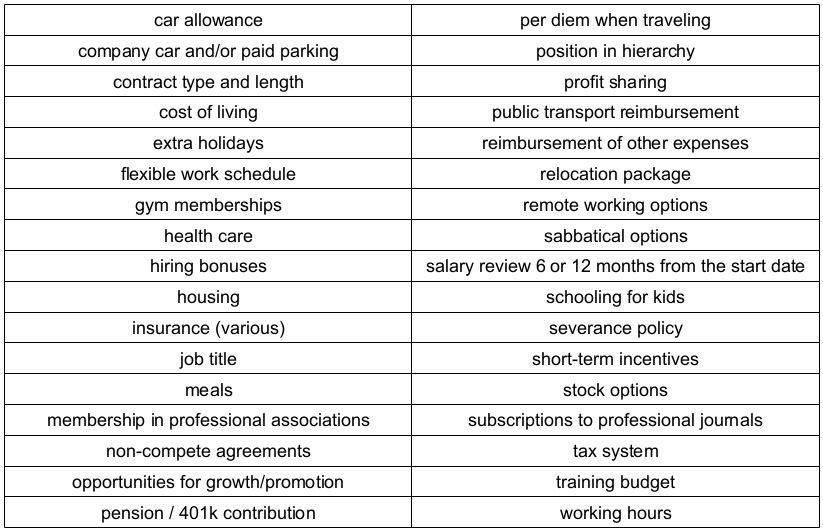
Show me the money: how (not) to negotiate your salary
What’s the best approach to negotiating your salary? The most important thing to do before you start is to assess your overall salary negotiation position – as proposed by Feldman and Schulinger:
- Are you currently employed?
- Do you have another job offer?
- Are you able to take a break / sabbatical (in case the negotiation fails, and you do not have a job at the moment)?
- Is this job offer your second / third / etc. choice, rather than the first?
Each “yes” is worth 1 point while each “no” is worth 0 points.
Now, based on the number of points, assess your negotiation position:

At Career Angels, we recommend you take it one step further: take the overall market conditions into consideration (the supply and demand for candidates). They can be analyzed by checking unemployment rates and the number of job ads, and by looking for opportunities that specifically fit your professional profile.
The power of negotiations
A survey by Salary.com discovered that:
– 37% of employees always negotiate their salaries,
– 18% never do,
– 44% have never even brought up salary during their performance reviews.
Linda Babcock’s study for her book “Women Don’t Ask” reveals that:
– 7% of women attempted to negotiate their first salaries (vs. 57% of men),
– of those who did negotiate: they got a 7% increase.
7% is not much? A Stanford negotiation professor, Margaret A. Neale, puts it into context for us:
If you and your counterpart who negotiates are treated identically by the company – you are given the same raises and promotions – 35 years later, you will have to work eight more years to be as wealthy as your counterpart at retirement.
EIGHT more years. That’s 2920 more days.
General truths
- What do we get paid for? For our time. For our expertise. Or a combination of both. At the end of the day, the total compensation package is the result of your potential added value and the potential risk of hiring you on top of the actual cost. And all that in the context of the market’s supply & demand for available candidates.
- Your current (or most recent) compensation level is NOT an indicator of your future salary.
- Employers expect job seekers to negotiate.
- The negotiation process starts with the first (in)direct contact.
- You communicate your value through ALL your tools and channels (LinkedIn, CV, how you write emails, the way you talk).
- The cheapest candidate doesn’t win.
- There are two different strategies when dealing with potential employers vs. headhunters.
- Corporations = more money than SMEs, but: more policies, procedures, bureaucracy, and therefore not too much latitude to offer something that does not fit their system.
- For international movers: fully understand the tax system of the target country and be ready to express local gross/net amounts.
- There are differences between the salary and the compensation package. Take note of them!
Salary vs. Compensation package

Additionally, you can negotiate for power – the intangible:
– join a team or committee with “real” power,
– get access to strategic projects,
– work with key clients.
Prepare. Prepare. Prepare.
1) Research the market (network, portals like Monster.com, Salary.com, Glassdoor.com, PayScale.com, talking to recruiters & HR professionals); then define:
- Walkaway point = the absolute (!) minimum
- Value salary = market standard
- Aspirational salary = 5-15% above market
- Reach salary = highest number from research
2) Know your current total compensation package: When asked for your current salary, especially if it’s not a good benchmark, give the value of the total compensation package. Make a list of everything you have access to and ask yourself, “If I have to start paying for it, how much would it cost?” And the total cost added to your salary becomes the total compensation package. Additionally, rank the above from most to least important aspects, so you know what’s really important during the whole process.
3) BATNA (Best Alternative to Negotiated Agreement): Have one and be prepared to take it. Bluffing can backfire.
Be able to answer these questions:
- How many candidates like you are there? Is what you have to offer scarce / unique?
- How much money will you generate or help save?
- Can you tie your remuneration to tangible KPIs?
- Have you done the necessary research?
- Are you culturally aware? The where, when, how, and with whom will differ based on the region in which you’re negotiating. Read more on Harvard’s fantastic negotiation blog.
More tips
- Get the whole offer with all the details (not just the salary) in writing, because a verbal offer is only worth the paper it’s written on.
- Thank the other party after every interaction and communicate by when you’ll come back.
- For complex contracts and/or compensation packages – ask a lawyer to look through them.
- During interviews: delay the money talk as much as you can.
Ideally: get the company to make you an offer.
If they insist: ask for a detailed job description with KPIs and goals, and ask for 2-3 days to express your expectations. With that kind of information, it’ll be easier to research the company / competitors and/or reach out to a headhunter / network. - Ask for a precise number: Research from Colombia Business School shows using a specific number in negotiations is more effective than an approximate number. Why? Asking for $62,945 rather than $63,000, for example, tends to indicate you’ve done extensive research into the market in order to come up with a number.
Plug & play vs. non-ideal candidate
If you are not a “plug & play” candidate – in other words, if there’s a certain risk involved in hiring you, focus on getting the job first and ask upfront for a salary review within 6 months based on previously set targets or KPIs. Or suggest doing a paid project first in order to get hired later at full salary. Avoid saying things like, “Once you hire me, I’ll refresh my Spanish skills.” Instead, download Duolingo and start practicing right away!
The recruiters’ role
From the employer’s perspective:
– to decrease the risk of a mismatch,
– to handle the whole process.
From the candidate’s point of view:
– the company’s ambassador,
– somebody who can (but doesn’t have to) negotiate on your behalf,
– a source of information (build and foster a network of 2-3 trusted headhunters!).
Tip: Be honest & transparent with your Executive Search Consultant. They should understand your reasoning and salary range / package flexibility, BUT: but private stays private! You don’t want somebody to have pity on you, because e.g. you mentioned that you are in debt, or because you have 5 kids.
Final wise words
- Remember the big picture. You have already received an offer. They obviously want you. Be tactful. You want to be able to actually start working with your (potential) superiors and not get off on the wrong foot.
- Respect the time and energy of everyone involved. Focus on what’s really important and let the small stuff go.
- Stay calm: emotions don’t help. Don’t get offended if the initial offer is too low – it might be part of the game. Sometimes a junior HR specialist or a lawyer who was not fully briefed simply worked off a template. They might not have the full picture. The various levels might not have shared all the information or promises across all interviews. Be honest with how far they are from the mark and be creative in how you can make up the difference immediately or in the long term.
- Be patient: bureaucracy takes time. Exerting pressure is usually counterproductive.
- If you are actively looking for a job: don’t stop until the actual contract is signed.
- Throughout the process, show and express your interest & enthusiasm.
Last, but not least: to quote Thomas J. Friel, Retired Chairman & CEO of Heidrick & Struggles Intl. Inc:
[…], decide what is critical, and what is merely desirable. When negotiations hang up on one issue and everything else is acceptable it is normally because of ego and emotion. […] Last-minute surprises or additional requests after a negotiation is concluded are never a good idea. Let the other party win something that is more important to them than it is to you.
Done? Not yet.
A counteroffer from your current employer might follow.
CEB’s study – quoted in the HBR article “Why people quit their jobs” – reveals that 50% of employees who accept a counteroffer leave within 12 months. Other statistics suggest that the number is even as high as 80% after 6 months and 93% after 18 months.
Our tip: when you start looking for a job, make a list of the reasons why you want to leave – ideally: write a letter to yourself. Once you receive a counteroffer, re-read the list. That should help you make up your mind!
Are you getting ready for your own salary negotiations? Would you like to confidentially discuss your strategy? Maybe you feel like you could use some assistance?
- Get in touch with us by sending an email to Contact@CareerAngels.eu or by filling out this form on our website. We’ll schedule a 20-30-minute consultation for you with one of our experienced consultants – completely free of charge!



